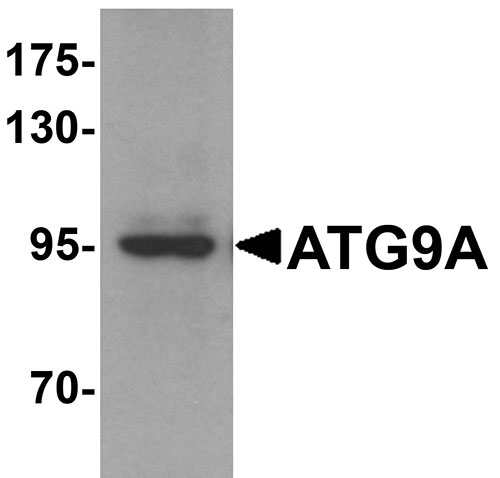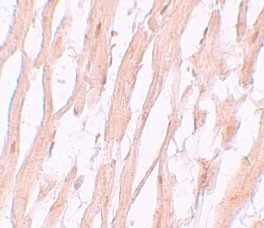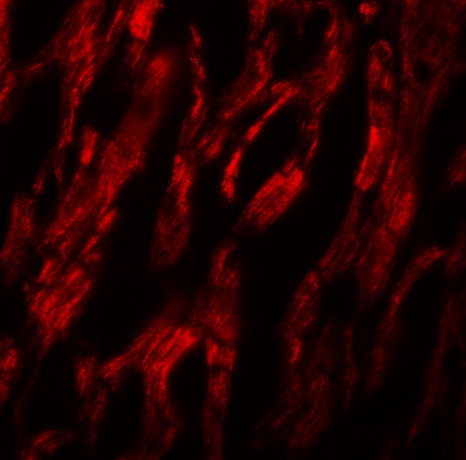ATG9A Antibody
- SPECIFICATION
- CITATIONS
- PROTOCOLS
- BACKGROUND

Application
| WB, IHC-P, IF, E |
|---|---|
| Primary Accession | Q7Z3C6 |
| Other Accession | NP_076990, 116089287 |
| Reactivity | Human, Mouse, Rat |
| Host | Rabbit |
| Clonality | Polyclonal |
| Isotype | IgG |
| Calculated MW | 94447 Da |
| Application Notes | ATG9A antibody can be used for detection of ATG9A by Western blot at 1 µg/mL. Antibody can also be used for immunohistochemistry starting at 5 µg/mL. For immunofluorescence start at 20 µg/mL. |
| Gene ID | 79065 |
|---|---|
| Target/Specificity | ATG9A; |
| Reconstitution & Storage | ATG9A antibody can be stored at 4℃ for three months and -20℃, stable for up to one year. As with all antibodies care should be taken to avoid repeated freeze thaw cycles. Antibodies should not be exposed to prolonged high temperatures. |
| Precautions | ATG9A Antibody is for research use only and not for use in diagnostic or therapeutic procedures. |
| Name | ATG9A {ECO:0000303|PubMed:20124090, ECO:0000312|HGNC:HGNC:22408} |
|---|---|
| Function | Phospholipid scramblase involved in autophagy by mediating autophagosomal membrane expansion (PubMed:22456507, PubMed:27510922, PubMed:29437695, PubMed:32513819, PubMed:33468622, PubMed:33850023, PubMed:32610138, PubMed:33106659). Cycles between the preautophagosomal structure/phagophore assembly site (PAS) and the cytoplasmic vesicle pool and supplies membrane for the growing autophagosome (PubMed:16940348, PubMed:22456507, PubMed:33106659). Lipid scramblase activity plays a key role in preautophagosomal structure/phagophore assembly by distributing the phospholipids that arrive through ATG2 (ATG2A or ATG2B) from the cytoplasmic to the luminal leaflet of the bilayer, thereby driving autophagosomal membrane expansion (PubMed:33106659). Also required to supply phosphatidylinositol 4- phosphate to the autophagosome initiation site by recruiting the phosphatidylinositol 4-kinase beta (PI4KB) in a process dependent on ARFIP2, but not ARFIP1 (PubMed:30917996). In addition to autophagy, also plays a role in necrotic cell death (By similarity). |
| Cellular Location | Preautophagosomal structure membrane; Multi-pass membrane protein. Cytoplasmic vesicle, autophagosome membrane; Multi- pass membrane protein. Golgi apparatus, trans-Golgi network membrane; Multi-pass membrane protein. Late endosome membrane; Multi-pass membrane protein. Recycling endosome membrane; Multi-pass membrane protein. Endoplasmic reticulum membrane; Multi-pass membrane protein. Mitochondrion membrane; Multi-pass membrane protein. Note=Mainly localizes to the trans-Golgi network (TGN) and the endosomal system; cycles between them though vesicle trafficking (PubMed:27316455, PubMed:27663665). Export from the TGN to promote formation of autophagosomes is mediated by the AP-4 complex (PubMed:29180427, PubMed:30262884). Under amino acid starvation or rapamycin treatment, redistributes to preautophagosomal structure/phagophore assembly site (PAS) (PubMed:16940348). The starvation-induced redistribution depends on ULK1, ATG13, as well as SH3GLB1 (PubMed:16940348). Upon autophagy induction, a small portion transiently localizes to the autophagic membranes (PubMed:22456507) Recruited to damaged mitochondria during mitophagy in a RIMOC1- dependent manner (PubMed:34432599). |

Thousands of laboratories across the world have published research that depended on the performance of antibodies from Abcepta to advance their research. Check out links to articles that cite our products in major peer-reviewed journals, organized by research category.
info@abcepta.com, and receive a free "I Love Antibodies" mug.
Provided below are standard protocols that you may find useful for product applications.
Background
ATG9A Antibody: Autophagy, the process of bulk degradation of cellular proteins through an autophagosomic-lysosomal pathway is important for normal growth control and may be defective in tumor cells. It is involved in the preservation of cellular nutrients under starvation conditions as well as the normal turnover of cytosolic components. This process is negatively regulated by TOR (Target of rapamycin) through phosphorylation of autophagy protein APG1. ATG9A, a multi-spanning membrane protein localizing to the Golgi apparatus and late endosomes, has been proposed to mediate membrane transport to generate autophagosomes. ATG9A has also been implicated as a regulator of STING (stimulator of interferon genes)-mediated innate immune response.
References
Gozuacik D and Kimchi A. Autophagy as a cell death and tumor suppressor mechanism. Oncogene2004; 23:2891-906.
Kisen GO, Tessitore L, Costelli P, et al. Reduced autophagic activity in primary rat hepatocellular carcinoma and ascites hepatoma cells. Carcinogenesis1993; 14:2501-5.
Kamada Y, Funakoshi T, Shintani T, et al. Tor-mediated induction of autophagy via Apg1 protein kinase complex. J. Cell. Biol.2000; 150:1507-13.
Webber JL, Young AR, and Tooze SA. Atg9 trafficking in mammalian cells. Autophagy2007; 3:54-6.
If you have used an Abcepta product and would like to share how it has performed, please click on the "Submit Review" button and provide the requested information. Our staff will examine and post your review and contact you if needed.
If you have any additional inquiries please email technical services at tech@abcepta.com.













 Foundational characteristics of cancer include proliferation, angiogenesis, migration, evasion of apoptosis, and cellular immortality. Find key markers for these cellular processes and antibodies to detect them.
Foundational characteristics of cancer include proliferation, angiogenesis, migration, evasion of apoptosis, and cellular immortality. Find key markers for these cellular processes and antibodies to detect them. The SUMOplot™ Analysis Program predicts and scores sumoylation sites in your protein. SUMOylation is a post-translational modification involved in various cellular processes, such as nuclear-cytosolic transport, transcriptional regulation, apoptosis, protein stability, response to stress, and progression through the cell cycle.
The SUMOplot™ Analysis Program predicts and scores sumoylation sites in your protein. SUMOylation is a post-translational modification involved in various cellular processes, such as nuclear-cytosolic transport, transcriptional regulation, apoptosis, protein stability, response to stress, and progression through the cell cycle. The Autophagy Receptor Motif Plotter predicts and scores autophagy receptor binding sites in your protein. Identifying proteins connected to this pathway is critical to understanding the role of autophagy in physiological as well as pathological processes such as development, differentiation, neurodegenerative diseases, stress, infection, and cancer.
The Autophagy Receptor Motif Plotter predicts and scores autophagy receptor binding sites in your protein. Identifying proteins connected to this pathway is critical to understanding the role of autophagy in physiological as well as pathological processes such as development, differentiation, neurodegenerative diseases, stress, infection, and cancer.




